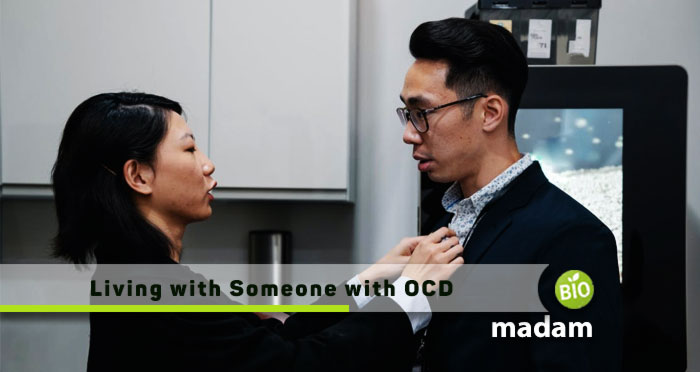Obsessive-Compulsive Disorder (OCD) is a disorder that significantly impacts the lives of millions of people in the U.S. and around the world. If one of those people is someone you love, you know that the effect of OCD influences far beyond the person who has been diagnosed with OCD. Living with someone with OCD requires a proper understanding of the disorder so that you can help them in a better way.
Although any intimate relationship has its own challenges, living with someone with OCD or dating someone affected by a chronic mental illness such as OCD can add some extra challenges and growth opportunities. It is imperative to put some effort into strengthening relationships between individuals with OCD and their family and friends. It can only be possible by promoting understanding and cooperation.
Learn How to Live with Someone with OCD
Follow these practical guidelines to deal with and learn how to live with OCD like a pro.
Identify Warning Signals
The first guideline stresses that family members acknowledge the “warning signs” of OCD. It is crucial to watch for behavior changes. Do not misinterpret significant behavioral changes as “just their personality.” Recall that these modifications can be gradual, but overall different from how the person has generally carried in the yesteryear.
Alarming Signals to Watch
- A person starts spending too much time alone, like in the bathroom, changing dress, washing hands, or doing any task.
- Repetitive behavior is one of the most visible signals
- Consistently self-judgment and self-criticism; excessive need for reassurance
- Complete simple tasks with too much time
- Continuous lethargy
- Increased unease for trivial things and details
- Severe and extreme emotional tantrums to small things
- Restless sleep
- Obsessed about tasks to complete so, they stay up late to get things done
- Change in Eating habits
- Daily life becomes a tussle
- Avoid social gatherings due to social anxieties.
People with OCD usually report that anxiety and anger make their symptoms worse. When people around them criticize or blame them for the symptoms, they can’t control them. Then they become anxious and stressed.
So it would be best if you learned to view an illness as what a person has, not who they are. And these features are not personality traits but signals of OCD. This way, you can share a hand with the person with OCD to combat the symptoms rather than get separated from them.
Adjust Your Expectations While Living With Someone with OCD

There are times when OCD signs or symptoms tend to flare up, or sometimes positive changes occur. But all kinds of changes, either positive or negative, bring stress to the life of a person with OCD. Family expectations and conflicts add fuel to the fire and result in the escalation of the symptoms.
Watch the comments you are going to give to the person with OCD. Your positive and moderate expectations can help them.
Do not Compare Progress rates between Individuals.
Everyone has their own severity of OCD symptoms and progress rate. Every person responds to the treatment at their own pace. So do not pressurize your loved one about their treatment and progress. Let them recover at their own rate and remember slow, gradual improvement may be more beneficial in the end if relapses are to be forbidden.
Day-to-Day Comparison of Progress
Avoid day-to-day comparisons of your family member’s progress because it’s misleading. It is misleading because it doesn’t give an overall picture of a person’s progress.
Rather than making subjective analyses and comments, encourage to use the of objective questionnaires to have an OCD progress assessment.
Acknowledge Small Improvements
People with OCD often complain that family members don’t understand their pain and stress. They do not acknowledge their accomplishments, such as cutting down hand washing by five minutes or resisting asking for reassurance one more time. While these gains may seem insignificant to family members, it is a massive step for your loved one. Acknowledgment of these seemingly small accomplishments really can be a powerful motivator.
Supportive Environment
If family members keep criticizing, it severely deteriorates the person with OCD’s condition. Learn about OCD and learn that OCD gets on everyone’s nerves. So, gang up on the OCD and explain in an even tone to your loved ones with OCD that the compulsions are the symptoms of OCD. You are surely not going to carry out their OCD around but are definitely supportive to overcome these OCD symptoms.
Be Sensitive to the Mood of your Loved One with OCD
Suppose you feel that your loved one with OCD is having a bad day with their OCD; it would help if you backed off for a while and let them deal with their negative thoughts. But be there for them.
Be Supportive of Them Taking Medicine
Assist them in visiting their doctor appointments and also help them to follow the medication regime as prescribed.
Avoid Lengthy and Vague Communication
Vague and doubtful communication may trigger anxiety and OCD. Always label the problem and keep your communication clear and straightforward.
Keep Your Family Routine “Normal”
Often families of people with OCD ask how to unwrap all of the effects of months or years of going along with OCD symptoms. For example, to “keep the peace” at home, a husband allowed his wife’s doubts and fears. And he prohibits their children from having any friends in the household or going around with their friends. A first shot to avoid conflict by giving in just grows; however, it is not a healthy approach. Children must have friends in their homes or family members to live their everyday routine lives. Through negotiation and limit setting, family life and routines can be well-kept-up. Remember, it is in the individual’s best interest to tolerate the exposure to their fears and be reminded of others’ needs as they begin to regain utility—their desire to do more increases.

Taking Care of Yourself While Living with Someone with OCD
Obsessive-compulsive disorder is a common disorder. Nearly 2% of the population is diagnosed with OCD. It is difficult to understand and cope with this disorder. Being a partner of someone with OCD or any severe mental illness, you yourself will face various challenges like emotional stress, physical fatigue, and mental exhaustion.
- Continue learning about the disorder. Read books and generals about the disorder. Seek information to understand your partner’s manifestation of illness in a better way.
- Do not put yourself in denial and accept your partner’s mental health issue—no doubt this disorder will disturb your flow of life. By accepting your partner’s illness, your journey will become easy. You will not feel shy, and you will be ready to ask for help if you need it.
- Prioritize your own needs as well.
- Seek out help from OCD support groups. Coping with a partner’s obsessive-compulsive disorder is not easy at all. While you live with someone with OCD, do not forget to take care of yourself.
Final Statement
You can only be supportive and loving of your partner if you maintain proper self-care for your own sake. You have to work on your well-being and strengthen your relationship with your partner with OCD.

Hi, my name is Eva. I am currently practicing as a clinical social worker, that being my childhood desire. As a licensed therapist holding MPhil in Clinical Psychology, I am now on biomadam to provide the natives with the best family advice! Do you have any questions? See you in the comment section.

